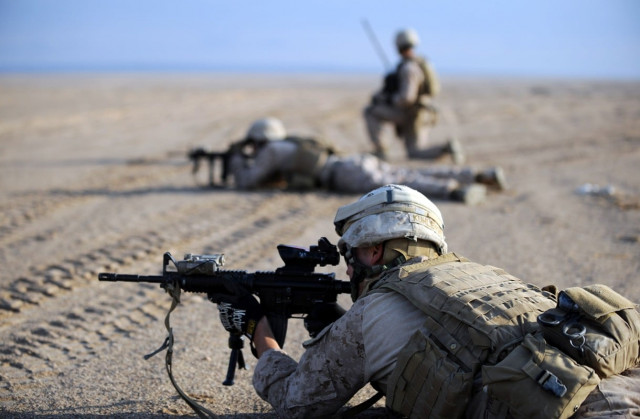Regional security matrix: Experts call for ending proxies in Afghanistan, resumption of Pak-India talks
Say conflicting interests, failure of social programmes and mistrust are keeping the region volatile.

File photo of US troops in Afghanistan. PHOTO: AFP/FILE
Diplomats, retired generals and journalists at a two-day conference on regional and national security have examined the core questions surrounding the future of the region after withdraw of the coalition forces from Afghanistan next year.
They suggested various strategies for reducing country’s vulnerabilities in the rapidly changing regional and global environment, said a press release.
The conference titled ‘Matrix of Regional and National Security in South Asia and its post-2014 dynamics”, being jointly hosted by Strategic Vision Institute (SVI) and Konrad Adenauer Foundation (KAS) of Germany, opened here on Wednesday.
Lt-Gen (retd) Muhammad Owais linked peace in the region to peace in Afghanistan. “To achieve this goal proxy wars in Afghanistan will have to be ended and some decision on US-Afghan Border Security Agreement will have to be reached”, he suggested.

Gen Owais also called for resumption of Pak-India Composite Dialogue for addressing the outstanding issues between the two countries. He said Pakistan would have to de-Islamise the polity and contain groups like Lashkar-i-Taiba and Jamaat ud Dawah.
He also urged India to end coercive diplomacy.
Executive Director of the Islamabad-based think-tank Centre for Research and Security Studies (CRSS) Imtiaz Gul said conflicting interests of regional and extra-regional powers, the failure of social programmes to change the tribal nature of Afghanistan and perceptions about US unilateralism were keeping the region unsettled.
He feared that the region would remain volatile and mired in security crisis until and unless Pakistan and India disengaged from their proxies and synergized their strategies on Kashmir and Afghanistan.
Ambassador Arif Kamal said Tehran’s nuclear deal with the West could provide a stepping stone for a broader deal between the two sides. He saw the timing of the deal as very critical and believed that it could provide relief to sanction-hit Iran, which in turn could adopt a more assertive posture in its regional dealings.

Mr Kamal said Iran’s increased assertiveness could strain Islamabad-Tehran ties. But, he warned Islamabad against entering into a conflict with Iran.
Former ambassador Khalid Khattak said convergences have increased between Pakistan and Russia but have failed to translate into tangible results because of “sluggish bureaucracies” in the two countries and mistrust.
Mr Khattak said Russia was interested in economic interventions in South Asia by promoting energy, trade and communication links.
Johan Sorensen, Head of Political, Trade and Communication section at the Delegation of the European Union said the EU continues to be a major trade actor in South Asia, and fostering trade between the EU and the countries in the region as well as intra-regional trade and regional integration can play a major role in enhancing stability and security.
President SVI Dr Zafar Iqbal Cheema in his comments on Pak-US ties it was in Islamabad’s interest to remain engaged with Washington.
Uncertainty looms large over horizon
Experts at a separate conference on the same theme agreed that though uncertainties loomed large over the horizon, it could be hoped that the Afghan government coming into power after the 2014 elections would be able to stand up to the insurgency
Things have changed in the war-torn country and it is not the Afghanistan of the 1990s. However, this optimism was based largely on the assumption that the Bilateral Security Agreement (BSA) would ultimately be signed between the US and the Afghan government.

The conference addressed by political analyst Lt-Gen (ret) Talat Masood, journalist Rahimullah Yousufzai and educationist Prof Dr Naheed Zia Khan was organized by the Islamabad Policy Research Institute (IPRI) on Wednesday on the institute premises.
All three experts agreed that the Talibans’ return to power was difficult as the country had undergone qualitative social and political changes.
The Afghans had become fed up with the Mujahedin when the Taliban emerged on the scene in the 1990s. “Had the Afghan Left regrouped at that time people would have welcomed them, too,” Yousufzai said.
They believed that there had been little progress in peace talks and it was not likely the Taliban would agree to power sharing or accept the elected government. Their dominant group insisted that power which was taken from them ought to be returned to them. With such a mindset it would not be easy to conduct any political settlement after US withdrawal.
Moreover, the Taliban had no political organization for the Afghan government or the US to engage with. Therefore, prospects of peace in the post-withdrawal scenario were indeed doubtful.
Gen Masood warned Pakistan against supporting the Taliban or trying to divide them in the negotiations. “Pakistan has no option but to play a positive role in peace efforts and bringing stability to Afghanistan,” he asserted.
Yousufzai said Pashtun representation in the Afghan parliament was falling due to Taliban terror and this could go in favour of Dr Abdullah Abdullah who was a front runner for president in the coming elections.
Dr Naheed Zia Khan dwelt on the economic prospects in the wake of the withdrawal which were not hopeful as there was large scale capital flight under way due to uncertainty, and fear of business losses due to closure of contracts could squeeze an economy mostly dependent on foreign aid.
Published in The Express Tribune, December 19th, 2013.



















COMMENTS
Comments are moderated and generally will be posted if they are on-topic and not abusive.
For more information, please see our Comments FAQ